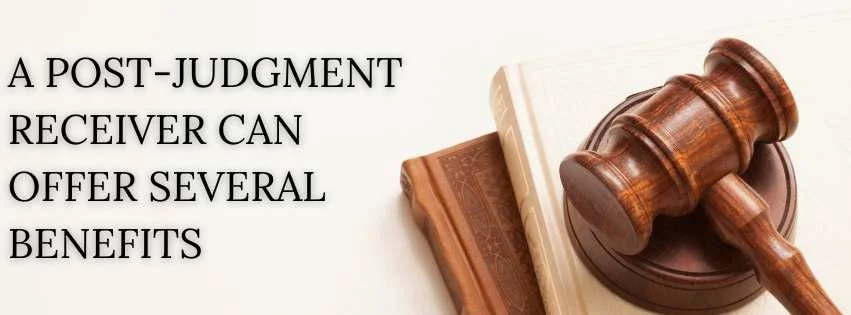Unlocking the Power of Post-Judgment Receivers: Strategies, Benefits, and Legal Insights
The receiver appointed after a judgment has the inherent authority to promptly start liquidating the assets of the debtor to fulfill the judgment creditor's claim. Additionally, appointing a post-judgment receiver can offer several benefits to the judgment creditor.
What is the difference between a trustee and a receiver?
A trustee and a receiver are distinct roles: a trustee is designated to oversee assets on behalf of another party, while a receiver is appointed to manage assets with the purpose of recovering debts or assets for a creditor. It's important not to confuse these two roles as they serve different functions and responsibilities.
What is a post-judgment receivership?
A post-judgment receivership refers to the legal process whereby a receiver is appointed by a court after a judgment has been made against a debtor. The receiver's role is to take control of the debtor's assets and manage them in order to satisfy the judgment creditor's claim. This typically involves liquidating assets and distributing the proceeds to the creditor to fulfill the judgment.
In legal practice, the authority for the appointment of a post-judgment receivership is typically outlined in relevant statutes or laws. Courts have the discretion to appoint a receiver to enforce a judgment when it's demonstrated that a receivership is a reasonable approach to fairly and orderly satisfy the judgment, taking into account the interests of both the judgment creditor and debtor. A post-judgment receiver operates in favor of the judgment creditor. This receiver has the authority to seize the judgment debtor's assets, utilize any incoming cash flow, or sell off assets with the aim of fulfilling the judgment, all under the supervision and approval of the court.
An additional distinctive feature of post-judgment receivership proceedings, particularly in California, is outlined in C.C.P. § 685.070(a)(5). This provision allows the receiver to include their fees and expenses in the total amount of the judgment collection. Consequently, it is the judgment debtor, rather than the judgment creditor, who covers the expenses associated with the California court-appointed receiver, provided the receiver successfully recovers the full amount of the judgment.
What are the Benefits of Utilizing a Post-Judgment Receiver?
There are numerous reasons for a judgment creditor to enlist the services of a post-judgment receiver, instead of pursuing the conventional and arduous path of identifying and seizing a debtor's assets independently. A post-judgment receiver often serves as a skilled forensic accountant, capable of swiftly investigating, locating, and seizing a judgment debtor's assets shortly after their appointment. Achieving comparable results may prove challenging for a solitary judgment creditor, even after months of investigation, issuing subpoenas, levying assets, obtaining turnover orders, seeking assignment orders, and conducting examinations of the judgment debtor. A post-judgment receiver possesses the immediate ability to seize and examine a judgment debtor's bank accounts, business equipment, financial records, computer data, and even mail.
While it may take weeks or months for a judgment creditor's subpoena of bank records to yield a response, a post-judgment receiver can promptly access the debtor's bank records with a court-issued order. Armed with this information, a post-judgment receiver can expeditiously trace and recover previously undisclosed assets of a judgment debtor held in other bank accounts. Additionally, a post-judgment receiver may have the capacity to recover assets situated beyond a specific jurisdiction (or even outside the country) through the issuance of a demand letter, whereas a judgment creditor acting alone would need to navigate through sister state or foreign money judgment procedures. Courts have affirmed the legitimacy of creditors or receivers utilizing these procedures to facilitate the collection of a money judgment.
Distinctive Authorities of Post-Judgment Receivers
〰️
Distinctive Authorities of Post-Judgment Receivers 〰️
A post-judgment receivership proves invaluable in cases involving fraudulent transfer of assets aimed at evading a judgment. The receiver has the authority to nullify such improper transfers and promptly reclaim the assets, often without initiating a new legal action. Furthermore, the receiver can take over the management of a judgment debtor's corporation to safeguard assets for satisfying the judgment. In instances where corporate board members are judgment debtors, the receiver may replace them. Alternatively, the receiver may be employed to liquidate a judgment debtor's stake in a partnership that is uncooperative in resolving the debt.
Ending a Post-Judgment Receivership
A post-judgment receiver is required to submit a final report and account to the court and obtain a court order to officially close the estate, similar to the procedures followed for pre-judgment receiverships. Additionally, the court has the authority to discharge the receiver spontaneously at any point. Once the discharge order of a post-judgment receiver is entered, it becomes final, allowing any disputing party to file an appropriate appeal.
If the judgment debtor declares bankruptcy during the receivership term (excluding actions necessary to preserve estate assets), the receivership is terminated. In such cases, the receiver is considered a custodian under bankruptcy law and must transfer all estate property to the trustee or debtor in possession in the bankruptcy case. The receiver/custodian can then seek reimbursement for receiver costs and fees through a noticed motion filed in the bankruptcy court. It's crucial for a post-judgment receiver working on behalf of a judgment creditor to swiftly liquidate assets and transfer them to the creditor to prevent relinquishing seized assets to a bankruptcy trustee.
In summary, post-judgment receiverships for aiding in collection are often underestimated by judgment creditors. The legal procedures involved, which mirror those for appointing a pre-judgment receiver, are already familiar to receivers. The potential benefits of utilizing post-judgment receiverships can be significant.

